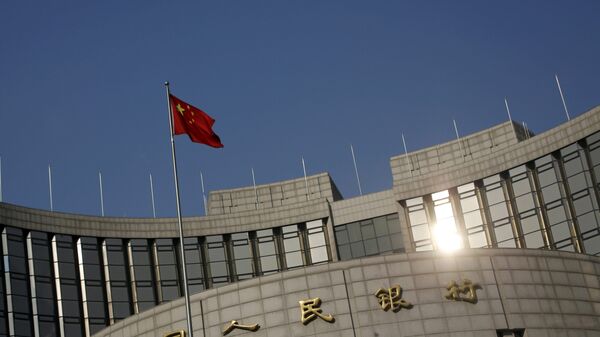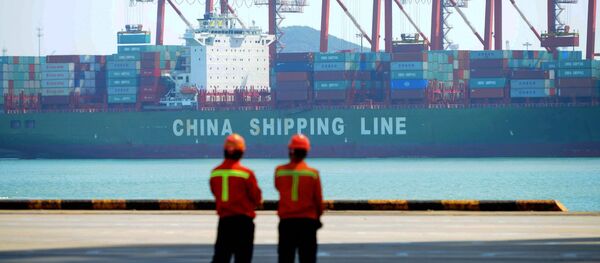The Second Belt and Road Forum for International Cooperation is scheduled to be held in Beijing from April 25-27, when 37 heads of state, including Russian President Vladimir Putin, Italian Prime Minister Giuseppe Conte and Pakistan’s Prime Minister Imran Khan, are expected to attend the 3-day event.
READ MORE: US Charges Former GE Engineer, Chinese Businessman With Economic Espionage
Despite Beijing’s insistence that the BRI is an inclusive initiative that promotes inter-connectivity and trade that would bring mutual benefits to all the parties involved, US Vice President Mike Pence accused China of leading partners into debt traps and hurting their independence.
"Know that the United States offers a better option. We don’t drown our partners in a sea of debt. We don’t coerce or compromise your independence. The United States deals openly, fairly. We do not offer a constricting belt or a one-way road," Pence said during a speech at the APEC Summit last year, without naming China explicitly.
With the exception of Italy, most of the nations that have endorsed the BRI are developing countries from Asia, Africa and Latin America, while 17 Arab states decided to join the Chinese initiative last week during the second China-Arab Forum on Reform and Development held in Shanghai.
Exporting Overcapacity
Chinese political analysts argued that the primary goal of China’s BRI was to sustain rapid domestic economic growth by exporting its excessive production capacity, especially in the infrastructure construction sector, while Beijing had little interests in compromising the recipient nations’ independence with debt traps.
"The BRI is a colossal program. So it carries various goals. One of the main concerns when the BRI was first discussed in 2015-16 was the domestic economic conditions in China at the time, when economic growth began to slow amid falling domestic demand. To sustain growth in the manufacturing industry, China had to export its excessive capacity. The main beneficiaries would be key interests groups in China such as state-owned enterprises. Building infrastructure overseas can help sustain rapid economic growth in China," Zhang Baohui, the director of the Center for Asian Pacific Studies at Hong Kong's Lingnan University, told Sputnik.
The expert suggested it is not in Beijing’s interests to see the recipient countries failing to pay off Chinese loans, as it would bring additional burden for China as well.
"Though a mutually beneficial agreement, China would offer the funds, equipment or even Chinese labor to build the infrastructure projects. Once the projects are completely, they would belong to the country where they’re built. They would have nothing to do with China, unless it’s a situation like the port in Sri Lanka, which failed to generate profits after completion. That’s why China had to try to manage it and make it profitable. But this is a rare case. Most of the completed projects would belong to the host nations," he said.
New Rules Today
Even if the recipient countries struggle to pay off Chinese debts, there’s not much China could do as the world order has changed from 200 years ago when the British Empire would send warships globally to collect its debts, other Chinese political analysts pointed out.
"It’s common sense among investors that if a poor nation owes another country a lot of money, there’s not much the creditor country could do. In today’s world, it’s impossible for a nation to repeat what the British Empire did 200 years ago, when it dispatched its warships and tried to seize the land or important mines in the recipient country. For example, with Sri Lanka, what else China could do to collect its debt?" Ding Xueliang, director of the Institute for China's Overseas Interests, Shenzhen University, told Sputnik.
"I believe it’s a very bad thing for China to take on this heavy burden of issuing policy investments without short-term return. China simply can’t handle this. I don’t think China has a strategy to make such long-term investments with little chances of profit in the near future. Maybe China took 1-2 projects like that for promotional purposes for the BRI. But it would be too much trouble for China to take on a large number of similar projects," he said.
No Cold War Blocs
Ding suggested that Chinese authorities could have been more candid when they first explained the goals of the BRI, which could have helped avoid the backlash.
"I think China has already started to adjust its message and strategy about the BRI. It would better if such adjustments came earlier. In terms of its message, China no longer stresses that the BRI is for the sake of the recipient countries. Before that, other countries always raised the question: how China can be so selfless? That’s also why we (as scholars) called on Chinese authorities to send out more trustworthy and reliable messages. No one would believe in the message that ‘you’re trying to serve the whole world,’" he said.
Despite the resistance the BRI faces from the United States and its traditional allies, it is unlikely for both Beijing and Washington to form separate blocs like the ones during the Cold War, the expert noted.
READ MORE: China Provides $2 Billion Loan to Pakistan's Ailing Economy — Report
"It’s very unlikely for new blocs to be formed today. Countries belong to the two blocs during the Cold War had almost no interaction with each other. But once countries started to trade and do business with each other, it’ll be very difficult to define which country belongs to what bloc. The world has changed today," he said.
The expert added that China could try to convince traditional US allies on specific projects, although it is unlikely for Beijing to win most of them over to the BRI.
The views and opinions expressed by the experts in this article do not necessarily reflect those of Sputnik.






